Drawing from diverse academic and professional backgrounds, we work together to connect people, ideas and systems across the MIT community in ways that spark transformative and lasting change.
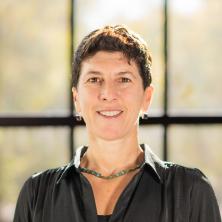
Julie joined MIT as the Institute’s first Director of Sustainability to found the Office of Sustainability and build a platform both unique to MIT yet with the intention of advancing the field at large. With this in mind, Julie launched MIT’s sustainability platform grounded in a methodology to leverage the role of the campus to solve for sustainability and a changing climate across multiple scales - at the levels of the individual, the campus, the city, the state, the country and the globe.
Julie is a pioneer in the field of campus sustainability and has worked for twenty-five years at a combination of public and private, and rural and urban campuses alike. In her work she has demonstrated that the actions and infrastructure of our campuses are integral to advancing and fulfilling the educational mission of Higher Education. She brings a systems thinking perspective to all of her work and seeks to build bridges between operational and academic partners alike to inform both her understanding of the challenges at hand and to develop solutions. Her prior research which she now applies, focused on the intersection between decision-making processes and organizational behavior in institutionalizing sustainability into higher education.
Prior to MIT, Julie was the founding Director of the Office of Sustainability for Yale University where she also held a lecturer appointment with the Yale School of Forestry and Environmental Studies. Julie came to Yale from the University of New Hampshire, Office of Sustainability Programs (OSP) where she assisted with the development of the program since its inception. As the field of campus sustainability took route, Julie was determined to bring the northeast pioneers together with the understanding that as colleagues we do our best work when we challenge each other’s thinking. With this in mind, Julie co-founded the Northeast Campus Sustainability Consortium, to advance education and action for sustainable development on university campuses in the northeast and maritime region.
Julie is also a Lecturer in MIT's Department of Urban Studies and Planning (DUSP) at MIT. She lectures and consults for universities both nationally and internationally, participates on a variety of boards and advisory committees and has contributed to a series of edited books and peer reviewed journals. Julie holds a BS in Natural Resource Policy and Management from the University of Michigan; an MS in Environmental Policy and Biology from Tufts University; and a Ph.D. in Natural Resources and Environmental Studies from the University of New Hampshire.
Recent projects
In addition to leading the office, Julie is responsible for the oversight and implementation of the Campus Impact Goals called for by MIT’s Fast Forward Climate action plan. Julie chairs the Carbon Footprint Working Group as well as a Net Zero 2026 faculty working group. Looking ahead, Julie will be working with an internal team to determine how MIT will decarbonize the campus by 2050.
Peer Reviewed Journal Articles
Velautham, L., Gregory, J., Newman, J., (2024). Science-based targets for higher education? Evaluating alignment between Ivy+ climate action plans and the Science-Based Targets initiative’s net-zero standards. International Journal of Sustainability in Higher Education.
Robinson, J., Alhakim, A.D., Ma, G., Alam, M., Brando, F.d.R., Braune, M., Brown, M., Côté, N., Espinosa, D.C.R., Garza, A.K., Gorman, D., Hajer, M., Madden, J., Melnick, R., Metras, J. Newman, J., Patel, R., Raven, R., Sergienko, K., Smith, V., Tariq, H., van der Lem, L., Wong, C.N.J. and Wiek, A. (2023). Odd couples: reconciling academic and operational cultures for whole-institution sustainability governance at universities, International Journal of Sustainability in Higher Education, vol. 24. Issue 8, pp 1949-1969.
Washington-Ottombre, C., Washington, G., Newman, J. (2018). Campus sustainability in the US:
Environmental management and social change since 1970. Journal of Cleaner Production. v. 196, 564-575.
Weber, S. Newman, J. (2017). Ecoregional analysis applied to campus sustainability performance. International Journal of Sustainability in Higher Education. pp.977-994.
Newman, J. (2012). An organizational change management framework for sustainability. Journal of Change Management. Galea ,C. [Ed.]. pp.65-75.
Newman, J, Rauch, J. (2009). Institutionalizing a greenhouse gas commitment at Yale. International Journal of Sustainability in Higher Education. Vol. 10 Iss: 4, 390 – 400.
Newman, J. (2009). Education for Sustainability – Designing an educational system for sustainability. Encyclopedia of Sustainability. Great Barrington, Massachusetts: Berkshire Publishing Group, LLC.
Newman, J., Weber, S.; Bookhart, D. (2009). Institutionalizing campus-wide sustainability: A programmatic approach. Sustainability: Journal of Record. vo.2 no.3 pp.173-178.
Newman, J., Rauch, J. (2009). Defining sustainability metric targets in an institutional setting. International Journal of Sustainability in Higher Education. v. 10. n.2., 107 – 116.
Newman, J., Rauch, J. (2008). Zeroing in on sustainability. Sustainability: Journal of Record. vo. 1. no.6, 387-390.
Newman, J. (2008). Reconceptualizing a model for service learning in the context of a sustainable campus. Practical approaches to ethics for colleges and universities. New Directions for Higher Education. No. 142. 17 – 24.
Edited volumes
Finnveden, G., Verheof, L, Newman. J. [Ed]. (2019). Sustainable Development and Higher Education Institutions: Acting with Purpose. Special Issue of Sustainability. MDPI.
Leal Filho,W, Brandli, L, Castro, Newman, J. (Ed). (2017). Handbook of Theory and Practice of Sustainable Development in Higher Education. Springer. Switzerland.
Newman, J. (Ed.). (2011). Green Education: An A-to-Z Guide. (vol.7). Thousand Oaks, CA: Sage Publications, Inc.
Newman, J. (Ed). (2011). Green Ethics and Philosophy: An A-to-Z Guide (vol. 8). Thousand Oaks, CA: Sage Publications, Inc.
Newman, J. Fernandez, L. (2007). Strategies for Institutionalizing Sustainability in Higher Education – Report on the Northeast Campus Sustainability Consortium 3rd Annual Conference. Yale School of Forestry and Environmental Studies. Report n.10. New Haven, CT: FES.
Books
Newman, J. (2009). Reaching Beyond Compliance: The Challenges of Achieving Campus Sustainability. Germany: VDM Publishing. Switzerland.
Book Chapters
Newman, J. and Weber, S. (2023). Accelerating Response to a Changing Climate: A Campus Strategy that Aligns Solutions Across Scales. Handbook of Sustainability in Higher Education: An Agenda for Transformational Change. Purcell, W.M. & Haddock-Fraser, J. (Eds.). Bloomsbury Press, London, U.K.
Newman. J. (2021). USA case study. Universities facing Climate Change and Sustainability. McCowan, T., Leal Filho, W & Brandli, L (Eds). Global University Leader Council, Hamburg.
Verhoef L.A., Newman, J. et al. (2020). Towards a Learning System for University Campuses as Living Labs for Sustainability. In: Leal Filho W. et al. (eds) Universities as Living Labs for Sustainable Development. World Sustainability Series. Springer Nature.
Newman, J. (2012). Sustainability Strategic Planning: Establishing Accountability in a World of Distractions. Transforming Higher Education. Edit. Peggy Barlett, Geoff Chase. MIT Press. Cambridge, MA.
Newman, J. (2010). Sustainability education. Siever, B. (Ed.). The Spirit of Sustainability Encyclopedia [pp.148-150]. Great Barrington, Massachusetts: Berkshire Publishing Group, LLC.
Newman, J. (2007). The impacts of cell phones and laptops in a sustainable world. Kleiman, S. (Ed). Displacing Place: Mobile Communication in the 21 st Century. [pp.77-83] New York, New York: Peter Lang Publishing.
Newman, J. (2006). The role of a campus sustainability professional in facilitating institutional reform. 147 Tips for Teaching Sustainability [pp.99-102]. Timpson, W. [Ed]. Madison, Wisconsin: Attwood Publishing.
Newman, J. Abrams, E. (2005). Organizational structure and rational choice: Unveiling the obstacles to integrating sustainability into decision-making in an institution of higher education. Leal Filho, W.(Ed) Handbook of Sustainability Research. Frankfurt, Germany: Peter Lang Scientific Publishing.
Publication in process
Leal-Filho, W., Newman. J., Salvia, A.L., Viera Trevisan, L.V., Corazza, L [Ed]. [Coming 2025]. North American and European Perspectives on Sustainability in Higher Education. World Sustainability Series. Springer Publications.
Conference Proceedings & Professional Reports
Newman, J. (2005, April). Strategies for integrating sustainability into higher education: A case analysis of Yale University. United Nations Decade of Education for Sustainable Development – The role of higher education institutions. Graz, Austria.
Newman, J. (2002, August). What keeps universities from fully embracing sustainability principles?: A presentation of a conceptual framework for research. Conference proceedings of the National Association of Environmental Education.
Newman, J. (2001, October). Consumer choice, sustainability, and a constructivist pedagogy. Conference proceedings of the National Association of Environmental Education.
Informational Articles and Instructional Materials
Newman, J. (2003, November). Is eating a moral act?: An exploration from agrarianism to consumerism. The Center for the Humanities Newsletter. No. 2
Newman, J. ; Diezel, J. (2001, January) Continuing connections through the curriculum and community. Connections Newsletter. Vol.16. No.1
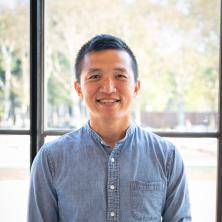
Yu joined the office to innovate MIT's sustainability data collection, reporting, and sharing efforts. In his role, he works closely with MITOS project managers and external partners to streamline data pipelines and unlock new possibilities for data application.
Passionate about combating climate change using a data-driven approach, Yu leverages his expertise in various fields, including climate science, software engineering, data analytics, and modeling, to help advance MIT's climate action goals.
Prior to MIT, Yu worked as a data scientist/consultant for various startups, where he experienced modern data engineering practices, implemented ETL pipelines and machine learning solutions using cloud infrastructures, and witnessed the value of collaborating closely with clients. He holds a Ph.D. in Meteorology and Physical Oceanography from the University of Miami and a B.S. in Atmospheric Sciences from National Taiwan University.
Collaborate with me on: Decarbonization, data management and pipeline automation, and sustainability data visualization.
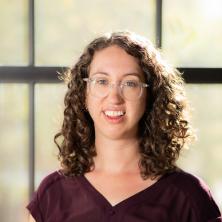
Rebecca is responsible for providing administrative support to the Director and all project managers in the Office of Sustainability. She is the office manager, human resources administrator, accountant, and event planner. She works closely with the Director on managing priorities and team wellbeing.
Rebecca is a co-chair for the MIT Working Green Committee, a group that promotes sustainability among staff members on campus, and manages and runs Choose to Reuse. Rebecca has a M.Sc. In Environmental Social Science from the University of Kent and a B.A. In Anthropology from the University of Massachusetts, Amherst.
Recent Projects: Choose to Reuse
Collaborate with me on: Sustainable events and purchasing
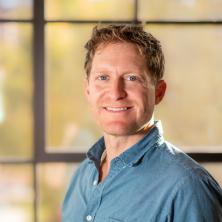
Brian joined the Office of Sustainability to help develop and demonstrate solutions for how the campus can become resilient and adapted to a changing climate. Brian is also responsible for helping MIT design waste out of our systems by testing and scaling solutions that impact supply chains, campus consumption and waste system behaviors and processes.
Brian explores and advances solutions by leveraging the campus as a test bed. Collaborations among MIT research groups, faculty, students and operational experts are used to collectively pilot test, develop, demonstrate and operationalize data-driven solutions.
Prior to MIT, Brian worked for 15 years addressing urban planning, climate change and sustainable development challenges across Africa, Asia, and the US at national, regional, city, and community scales with employers including AECOM Design and Planning, United Nations (Asia-Pacific) and James Corner Field Operations (New York City). Locally, Brian serves on his town’s Greenway Committee and the Open Space and Rec Plan Committee. Brian has a Master of Environmental Management from the Yale School of Environment and a B.A. from Union College (NY).
Recent projects: Brian is responsible for co-leading implementation of Fast Forward MIT initiatives including the Resiliency and Adaptation Roadmap, Waste Impact Goals, and Scope 3 Accounting. Recent resiliency activities include MIT Flood Risk Dashboard and MIT Flood Risk Analysis.
Collaborate with me on: Climate resiliency and adaptation planning, designing out waste, Scope 3 reduction planning
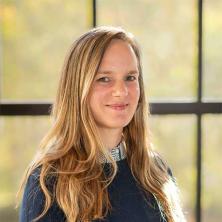
Susy joined the team to help implement the strategic framework for the Office during its launch in 2013, convening staff, students, and faculty from across the Institute around topics ranging from low-carbon commuting to organizational change. She is currently working to advance sustainable and accessible food systems and environmental justice on campus.
Susy revels in collaborating on dynamic programming, such as the Living Climate Futures Symposium, and building unique and impactful community partnerships, such as the Launchpad at the MIT students center, which incubates small and diverse local food businesses. As a representative of MIT, she also chairs the City of Cambridge’s Recycling Advisory Committee.
Prior to MIT, she worked to advance energy efficiency in schools and public buildings in the Northeast and helped manage a landmark nutrition education program in 70 public schools in Philadelphia. Outside of MIT, you can find her exploring new food spots in Boston or taking in the beauty of the Arnold Arboretum. Susy has an M.A. in Urban & Environmental Planning & Policy from Tufts University and a B.A. in English from Bryn Mawr College.
Recent projects: Progress toward a sustainable campus food system
Collaborate with me on: Food systems, environmental and climate justice, community partnerships, creating a culture of belonging in the sustainability field, experiential learning around farming and gardening

Steve helped establish the Office of Sustainability in 2013. Prior to this, Steve was leading campus sustainability efforts as Deputy Director within the MIT Environmental Programs Office.
With a focus on climate and energy work, Steve works to develop, promote, and coordinate programs to advance the Institute’s commitment to sustainable practices, while integrating campus-focused research and learning opportunities with MIT’s faculty, students, and the broader community. Steve serves on several advisory and working committees serving the Institute, the Cities of Cambridge and Boston, and his hometown of Winchester.
Before joining MIT, Steve worked in a variety of environmental research and planning capacities in management consulting, technical consulting, and non-profit policy research, including the World Resources Institute, United Nations Development Programme, World Bank, and Arthur Andersen.
Steve is an environmental planner by training with over 20 years experience in environmental policy development and program implementation. He holds a Bachelors degree in international economic development from Brown University, and a Masters degree in environmental policy and planning from the Massachusetts Institute of Technology.
Recent projects: Implementing MIT’s net-zero emissions by 2026 climate action plans, developing MIT’s greenhouse gas inventory, enhancing our DataPool visualizations
Collaborate with me on: Net-zero and zero emissions planning, greenhouse gas mitigation, renewable energy and carbon credit procurement strategy, data and decision-making, community collaborations
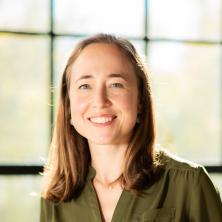
Ellie joined the office to advance school and department level climate action called for by MIT’s Fast Forward: Plan for Climate Action for the Decade. In her role, she engages in a collaborative solution design process with students, staff and faculty across MIT Departments, Labs, and Centers.
With a strong emphasis on data, Ellie leads the design and implementation of related data management, strategic planning, and analyses needed to develop the departmental level Sustainability and Climate Action plans.
Prior to MIT, Ellie worked as a geologist and project manager for the global sustainability consultancy ERM, where she focused on characterizing and remediating complex contaminated sites. Ellie currently serves as chair of her local Wetlands Protection Committee. She holds a M.A. in Earth and Environmental Sciences from Columbia University and a B.S. in Interdisciplinary Physics and Earth Systems Science from the University of Michigan.
Recent projects: Fast Forward MIT Campus Commitments and Collaborative Climate Action Program @ MIT
Collaborate with me on: Climate and sustainability action planning, climate mitigation, climate resiliency
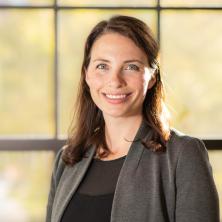
Nicole joined the office with a goal of engaging the campus community in sustainability efforts across MIT. In her role, she works closely with MITOS project managers and staff across the Institute to communicate programs, initiatives, and news in support of MIT’s work in responding to the challenges of a changing planet.
With a focus on digital media, Nicole uses a wide range of communication channels to engage and inform the MIT community of the important work of MITOS.
Nicole first joined MIT in 2014 working in communications and marketing in the MIT Alumni Association. There she focused on engaging alumni through social media and sharing stories of their work and volunteerism throughout the globe, reporting on topics from sustainable sanitation systems to commercial crew spacecraft. Outside of MIT, she serves on her local city council. She has a B.A. in journalism from the University of Rhode Island.
Recent projects: At Sustainability Connect 2024, a look at how MIT is decarbonizing its campus, Connecting the Dots, Office of Sustainability 2023 Impact Report
Collaborate with me on: Climate communications through video, articles, outreach, and events
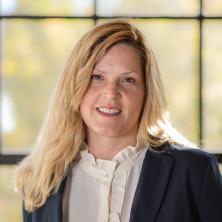
Dawn joined the office to enhance MIT’s culture of reuse, strengthen and amplify MIT’s efforts to design waste out of MIT’s procurement systems and institutional operations, and facilitate the highest and best use of recyclable materials. Launching from a strong foundation of MIT waste studies and successful design-out-waste practices, she accomplishes her work by partnering across MIT to identify opportunities for improvement, co-creating solutions, and on long-term planning to meet MIT’s waste impact climate commitments.
Dawn previously worked on waste reduction initiatives and planning with the City of Cambridge, Tufts University, and the Massachusetts Department of Environmental Protection’s Bureau of Air and Waste. Her work at MassDEP on waste ban compliance and policy incentives through monetary and technical assistance grants sparked an interest in policy work, which led her to earn an MPA at Northeastern University. She keeps current on recycling markets and legislation by serving on the board of the Northeast Resources Recovery Association.
Recent projects: Dawn served on the Boston Green Ribbon Commission’s Technical Advisory Group for Waste for the creation of the Carbon Free Boston report. At Northeastern University, Dawn wrote a three-piece analysis on the implications of legislating recycling in a non-waste ban state: Research Brief, Policy Brief, Recommendation.
Collaborate with me on: reuse systems, food waste recycling and reduction, and scaling waste reduction solutions through policy and systems improvement.

Leela is a post-doctoral researcher working jointly with MITOS and MIT’s Climate and Sustainability Consortium. Her research focuses on characterizing decarbonization pathways and net-zero targets and identifying common bottlenecks to achieving net-zero across both higher education and industry.
Leela’s work includes reviewing literature, conducting interviews with stakeholders, analyzing relevant sources of data and keeping up to date with various GHG accounting standards including Science Based Targets.
Prior to MIT, Leela graduated from UC Berkeley with a Ph.D. in Education in Maths, Science and technology, where she worked with Prof. Michael Ranney on a variety of projects that involved changing acceptance, beliefs, and emotions regarding climate change. During her Ph.D. she was also a UCOP Carbon Neutrality Graduate Student Fellow and worked at UC Berkeley’s Office of Sustainability on a variety of initiatives including managing the 2018-2021 campus greenhouse gas emissions inventory and helping to design and launch a business air travel mitigation pilot program for the campus. She has a combined Bachelors and Masters degree in chemistry from the University of Oxford (UK).


